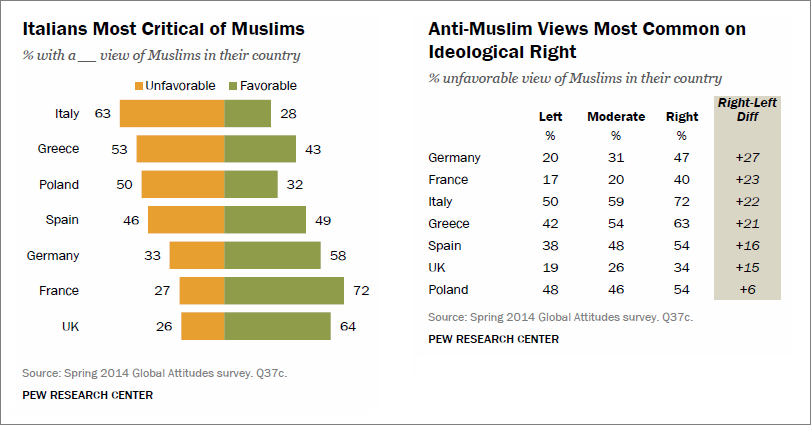
On the eve of elections to the European Parliament, the Pew Research Center has published its latest report on public opinion in the EU. It is based on face-to-face and telephone surveys in seven countries: France, Germany, Greece, Italy, Poland, Spain and the United Kingdom.
Summarising its findings on attitudes towards immigration, the report states:
A median of 55% want fewer immigrants admitted to their country. This includes particularly strong anti-immigrant sentiment in Greece (86%) and Italy (80%). A median of 52% say immigrants are a burden because they take jobs and social benefits, 48% complain they want to be distinct from the local society, and 36% say they are to blame for crime. People on the right of the political spectrum are generally more critical of immigration.
55% of respondents in the UK wanted fewer immigrants to be allowed into the country, while 36% supported existing levels of immigration and 6% favoured increased immigration.
On attitudes towards Muslims, the report found:
At least half of those surveyed in Italy, Greece and Poland say they have a negative opinion of the Muslims who live in their country. Public opinion is divided on this question in Spain, while in Germany and the UK a majority says they have positive views of Muslims. The most favorable ratings are registered in France (72% favorable), which among the seven nations surveyed has the highest percentage of Muslims in the national population.
As is the case with attitudes toward Roma, views about Muslims are tied to ideology. While 47% of Germans on the political right give Muslims an unfavorable rating, just 20% on the left do so. The gap between left and right is also more than 20 percentage points in France, Italy and Greece. And significant differences are found in Spain and the UK as well.
Attitudes are also linked to age, with negative sentiments more pervasive among older respondents. In Spain, about half of those age 50 and older (51%) give Muslims in their country an unfavorable rating; only a third of people under age 30 say the same. Significant differences between people 50 and older and 18- to 29-year-olds are also found in France (a gap of 12 percentage points), Germany (13 points), Italy (12 points) and the UK (9 points).

